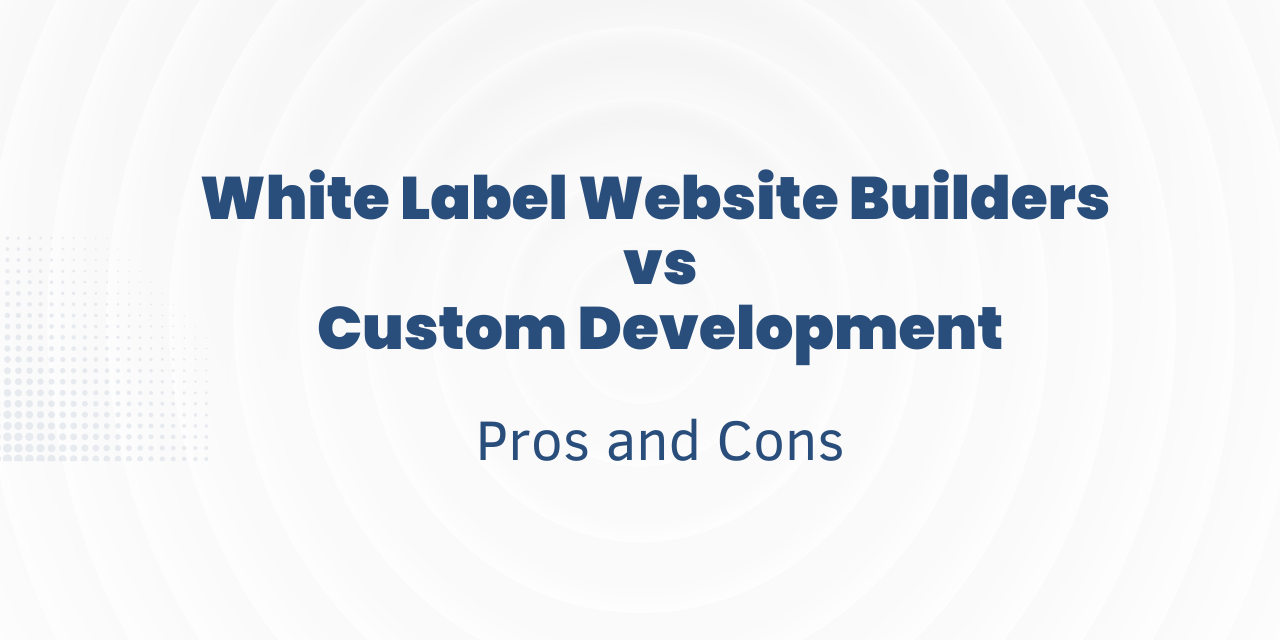When it comes to building websites, businesses have two main options: white label website builders and custom development. White label website builders provide ready-made platforms that allow users to create websites quickly and easily, while custom development involves creating a website from scratch, tailored to specific needs. In this article, we will compare white label website builders and custom development, exploring their pros and cons to help you make an informed decision for your website project.
Speed and Ease of Use
White Label Website Builders: White label website builders are known for their speed and ease of use. These platforms offer intuitive drag-and-drop interfaces, pre-designed templates, and user-friendly features that simplify the website creation process. With white label website builders, you can create a website within hours or even minutes, depending on the complexity of your requirements. The pre-built components and templates save time and effort, making them ideal for users who have little to no coding or design experience.
Custom Development: Custom development, on the other hand, involves creating a website from scratch, which can be a time-consuming process. It requires skilled developers to write code and design the website according to specific requirements. Custom development allows for complete flexibility and customization, but the process can take weeks or even months to complete, depending on the complexity of the project.
Customization and Flexibility:
White Label Website Builders: White label website builders provide a range of customization options, allowing users to tailor their websites to their specific needs. While there are limitations to customization compared to custom development, white label website builders offer a variety of templates, themes, and plugins that can be customized to align with the brand identity and requirements of the website owner. However, users may encounter restrictions when it comes to implementing highly unique or complex features.
Custom Development: Custom development offers unparalleled customization and flexibility. Developers have complete control over every aspect of the website, allowing for the implementation of unique designs, features, and functionalities. With custom development, there are no limitations in terms of design or functionality, making it the preferred choice for businesses with specific requirements or complex projects.
Cost Considerations:
White Label Website Builders: One of the main advantages of white label website builders is their cost-effectiveness. These platforms typically offer subscription plans with fixed monthly or annual fees, which are generally more affordable than custom development. White label website builders eliminate the need for extensive coding and design work, reducing costs associated with hiring developers or agencies for custom development projects. They are particularly suitable for small businesses and startups with limited budgets.
Custom Development: Custom development can be considerably more expensive than using a white label website builder. Since custom development requires skilled developers and more time to build the website from scratch, costs can quickly escalate. Custom development is generally suitable for businesses that require highly unique or complex websites and have the budget to invest in custom coding and design.
Maintenance and Support:
White Label Website Builders: White label website builders typically provide ongoing maintenance and support as part of their service. They handle the technical aspects, including updates, security, and hosting, allowing website owners to focus on managing their content and business. The support teams of white label website builders are readily available to assist users with any issues or questions they may have. This support infrastructure helps ensure that websites built using white label website builders remain functional and secure.
Custom Development: With custom development, the responsibility for maintenance and support falls on the website owner. This includes handling updates, security measures, and ongoing maintenance. Website owners may need to hire developers or agencies to provide ongoing support and ensure the website’s smooth operation. This adds an additional layer of complexity and cost to custom development projects.
Conclusion:
White label website builders and custom development each have their own set of pros and cons. White label website builders offer speed, ease of use, affordability, and ongoing support, making them an excellent choice for small businesses and individuals with limited technical expertise. Custom development, on the other hand, provides unmatched customization, flexibility, and scalability, making it ideal for businesses with specific requirements or complex projects. Carefully consider your budget, timeline, customization needs, and technical expertise when choosing between these options. By understanding the pros and cons of each approach, you can make an informed decision that aligns with your website goals.






